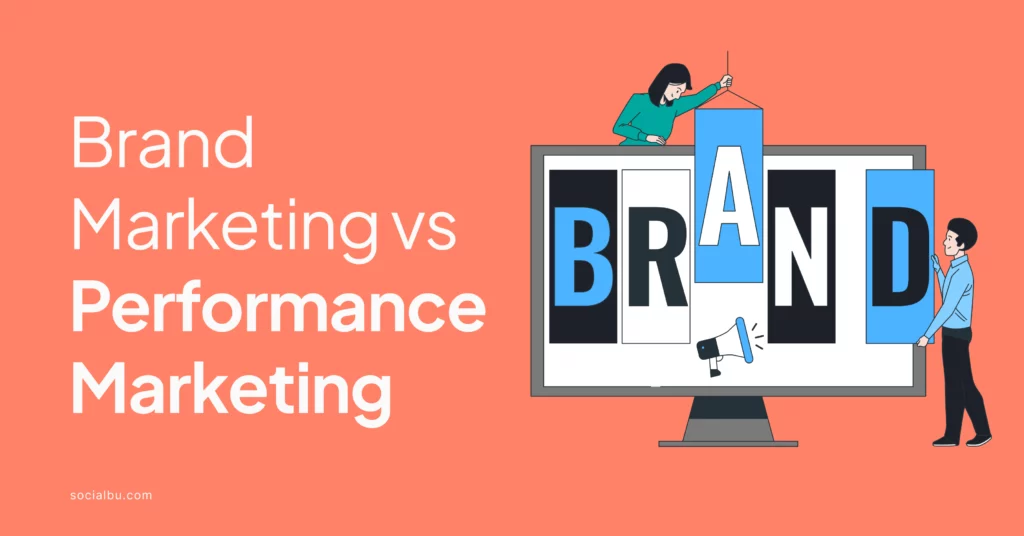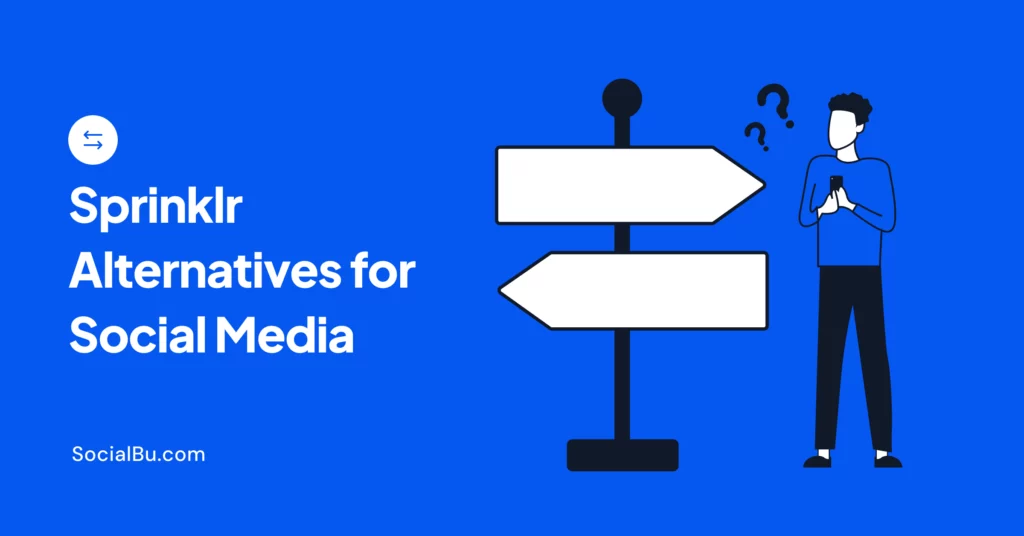When entering the marketing world, you’ll often encounter the terms brand marketing vs performance marketing. Although both are essential to a successful marketing strategy, they serve different purposes and achieve distinct outcomes.
Understanding the differences between these two marketing approaches can help brands make informed decisions on allotting resources in the best way. Let’s dive into this blog to know all the details about brand marketing vs performance marketing.
Brand Marketing vs Performance Marketing: Definition
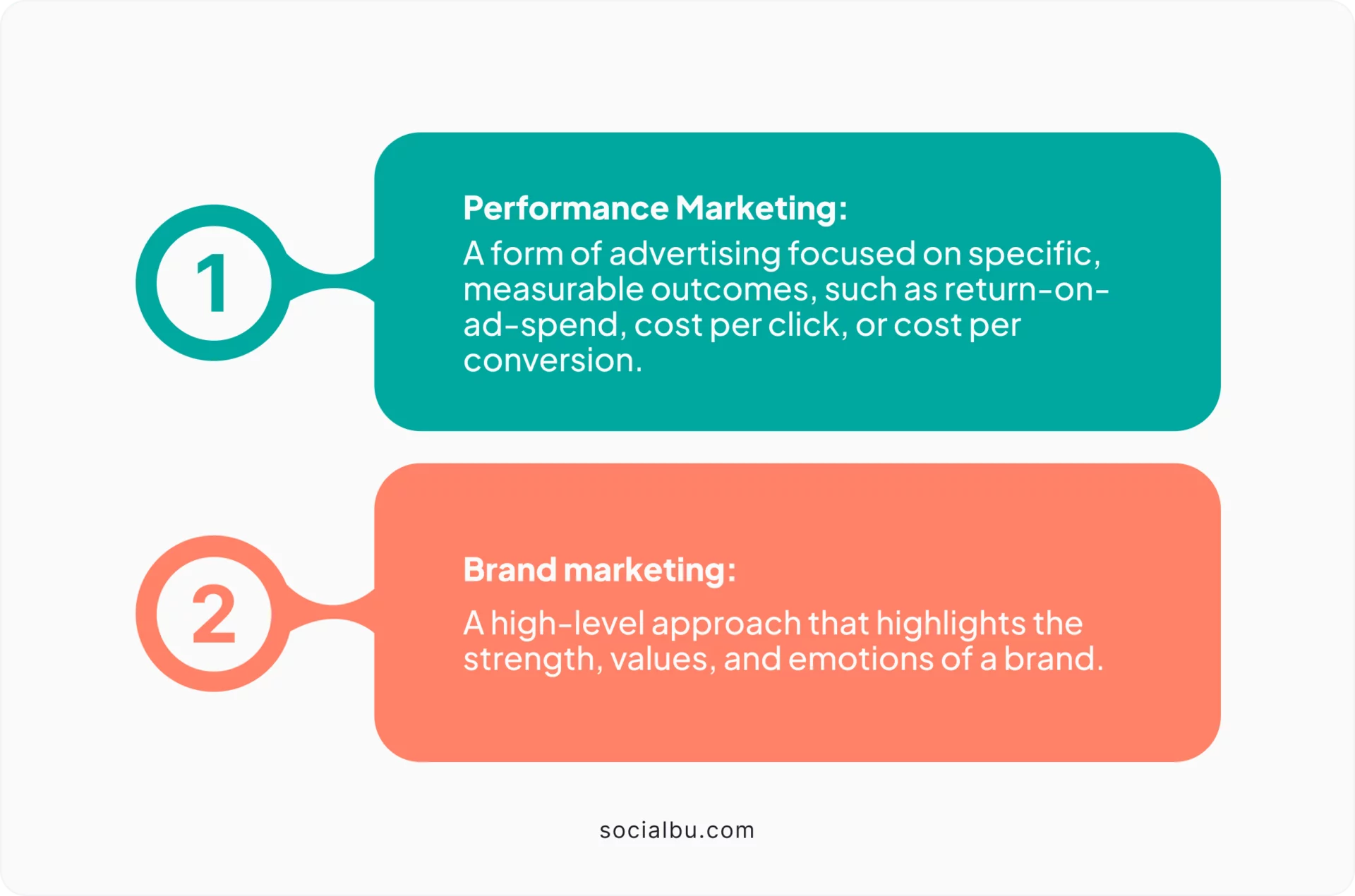
What is Brand Marketing?
Brand marketing focuses on making a long-term emotional connection with the target audience. It’s about constructing awareness, trust, and loyalty by consistently communicating a brand’s identity, values, and essence.
The primary goal is establishing a powerful brand presence in the market, leading to sustained growth and customer loyalty.
What is Performance Marketing?
Conversely, performance marketing is results-driven and focuses on achieving measurable actions like clicks, leads, conversions, or sales. This type of marketing is highly data-driven, where every marketing effort is tracked, measured, and optimized for the best possible return on investment (ROI).
Performance marketing is often synonymous with digital marketing strategies like pay-per-click (PPC) advertising, affiliate marketing, email marketing, and PPS for SaaS, allowing software companies to scale efficiently.
Importance of Brand Marketing vs Performance Marketing
Both marketing verticals hold great importance. Here are a few things you must know:
Brand Marketing
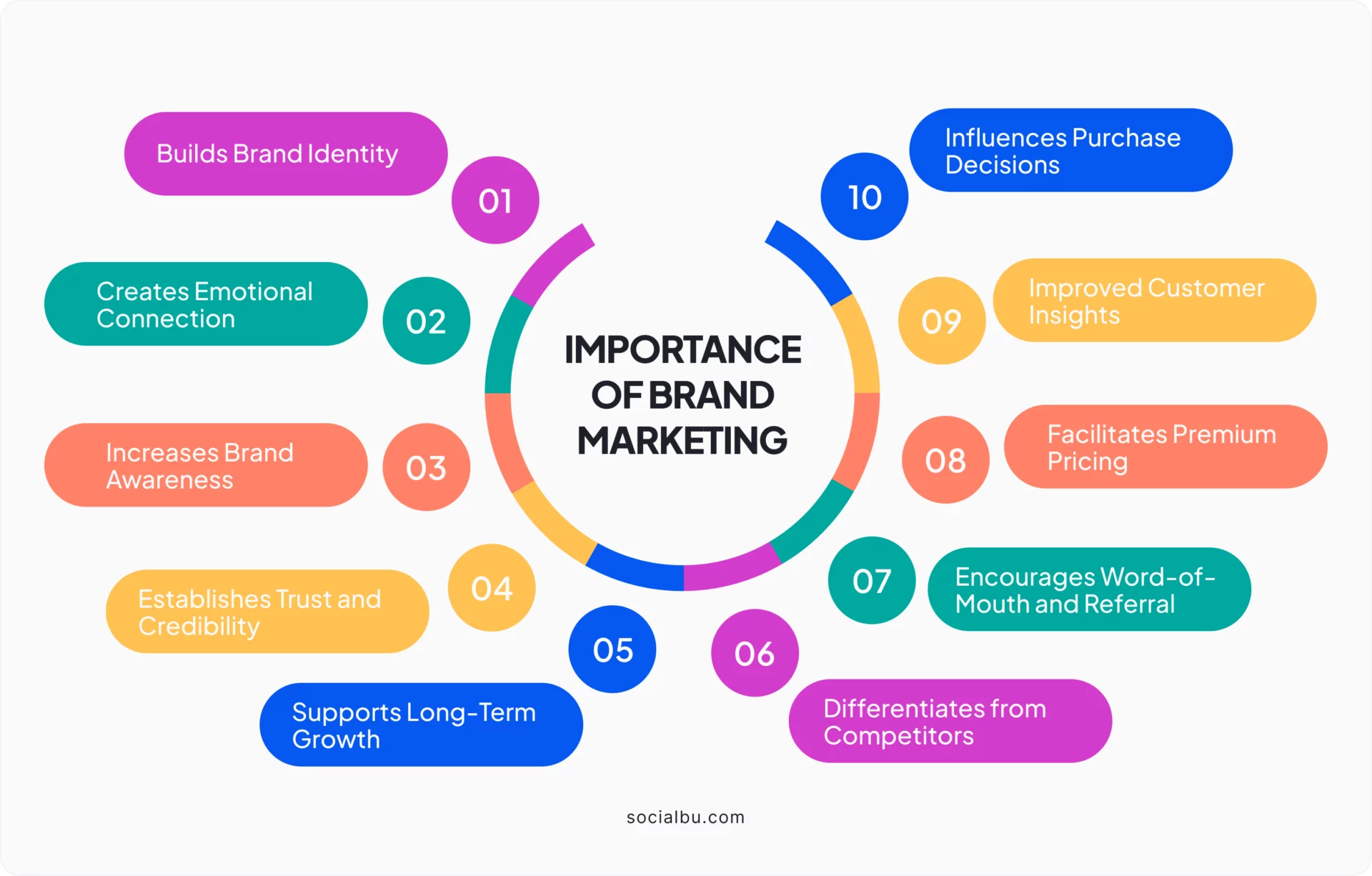
1. Trust and Loyalty Building
Brand marketing is vital for establishing trust and loyalty among customers. People who recognize and feel connected to your brand are more likely to select your products or services over competitors. A powerful brand evokes emotions and creates a sense of familiarity, facilitating long-term customer relationships.
2. Differentiation in the Market
In a crowded marketplace, brand marketing helps you stand out. You can differentiate yourself from competitors by clearly communicating your brand’s values, mission, and unique selling points. This distinct identity attracts customers and positions your brand as a leader in the industry.
3. Enhancing Value
Effective brand marketing can boost the perceived value of your products or services. A well-crafted brand image can justify higher pricing, too, by associating your offerings with quality, exclusivity, or other desirable traits. Customers often pay more for a brand they trust and admire.
4. Supporting Long-Term Growth
Brand marketing is an investment in the future. While the results may not be immediate, a strong brand continues to yield benefits over time. It creates a foundation for customer retention, repeat business, and word-of-mouth referrals, all contributing to sustained growth.
Performance Marketing
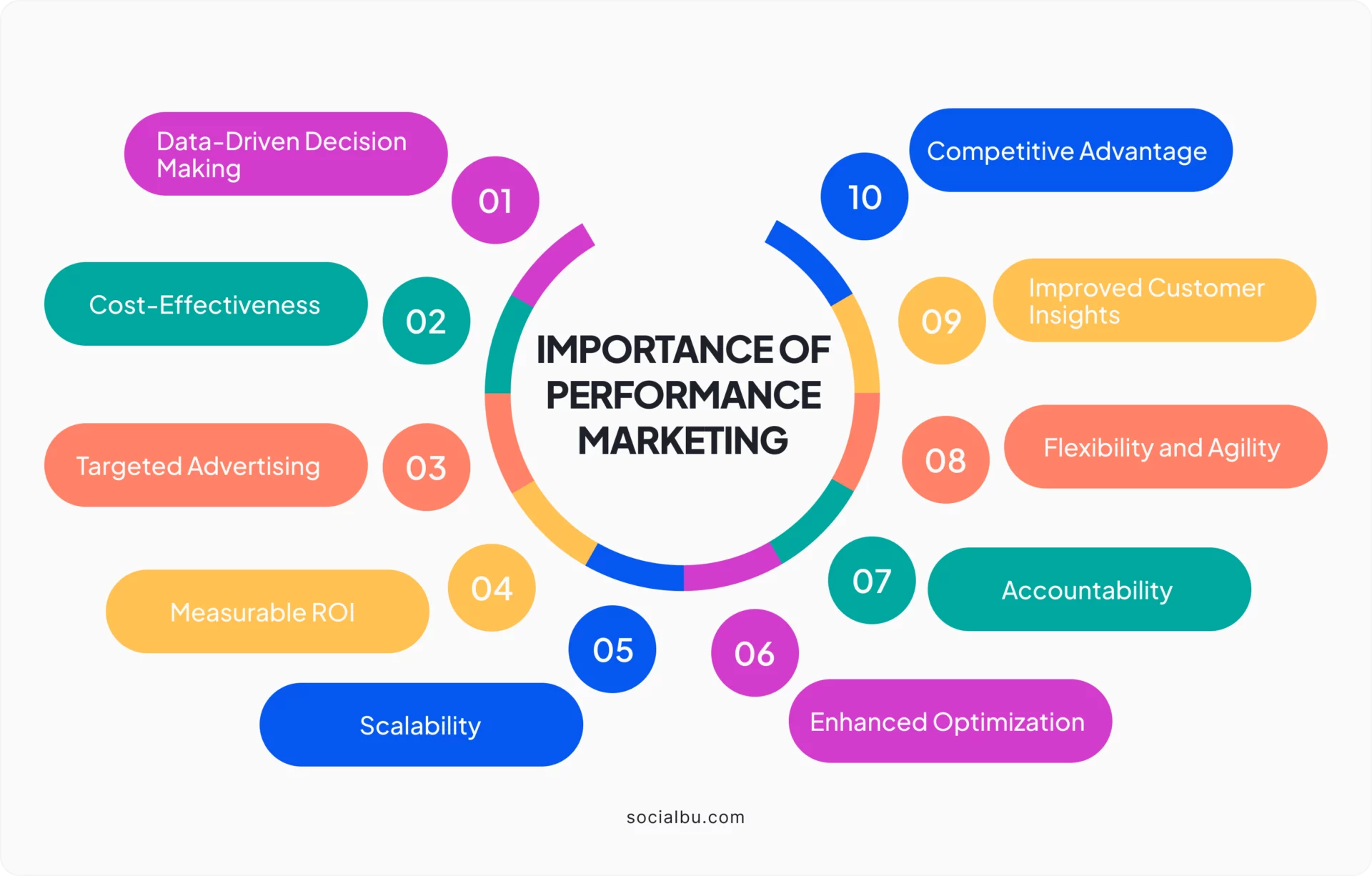
1. Measurable Results
One of the most significant advantages of performance marketing is its focus on measurable outcomes. Every action, from clicks to conversions, can be tracked and analyzed. This allows businesses to see exactly how their marketing efforts are performing.
Then, they can make data-driven decisions to optimize campaigns for better results. This is especially important in effective digital marketing.
2. Higher ROI
Performance marketing is all about efficiency. Businesses can boost their return on investment (ROI) by targeting specific audiences and optimizing for conversions. This makes it an ideal approach for companies seeking immediate results and further stretching their marketing budgets.
3. Flexibility and Scalability
Performance marketing campaigns can be effortlessly adjusted based on real-time data. If a certain ad or strategy isn’t delivering the desired results, it can be tweaked or replaced quickly. This flexibility enables businesses to effectively respond to market changes and scale successful campaigns.
4. Driving Immediate Action
Performance marketing is designed to drive specific actions, such as clicks, leads, or sales. This makes it a powerful tool for businesses that must achieve short-term goals, such as product launches, seasonal promotions, or sales targets.
By focusing on conversion-driven strategies, performance marketing delivers tangible results that contribute directly to a company’s bottom line.
Best Strategies: Brand Marketing vs Performance Marketing
Successfully executing brand marketing vs performance marketing requires various approaches, as they serve different objectives. Here’s a look at the best strategies for each and how they can work together for comprehensive marketing success.
Best Strategies for Brand Marketing

1. Develop a Powerful Brand Identity
Your brand identity—including your logo, color scheme, tone of voice, and overall visual style—is the foundation for all branding efforts. It needs to be consistent and recognizable across all platforms.
How to Implement: Work with designers and brand strategists to create a cohesive visual and verbal identity that reflects your brand’s values and appeals to your target audience.
2. Construct Compelling Brand Stories
Storytelling humanizes your brand and enables you to connect with your audience more emotionally. People remember stories more than they remember facts.
How to Implement: Craft narratives around your brand’s origin, mission, and the value it brings to customers. Share these stories through content marketing, social media, and video campaigns.
3. Build Brand Awareness through Consistent Messaging
Consistency in messaging helps reinforce your brand identity and assures that your audience always recognizes your brand, no matter where they encounter it.
How to Implement: Develop a brand messaging guide and ensure all team members and marketing materials align. Use consistent taglines, slogans, and brand values across all channels.
4. Leverage Social Proof
Testimonials, reviews, and user-generated content build trust and credibility, essential for brand loyalty.
How to Implement: Encourage satisfied customers to share their experiences on social media and highlight these testimonials on your website and marketing materials.
5. Invest in High-Quality Content Marketing
Content marketing is a powerful way to demonstrate your brand’s expertise, values, and personality. It also helps in building long-term relationships with your audience.
How to Implement: Produce valuable, informative, and entertaining content that resonates with your audience. This could include blog posts, videos, podcasts, infographics, and more.
6. Engage in Sponsorships and Partnerships
Partnering with other brands or sponsoring events can raise your brand’s visibility and associate it with positive experiences.
How to Implement: Identify events, influencers, or other brands that closely align with your values and target audience. Develop mutually advantageous partnerships that can boost your brand’s reach.
7. Invest in Good Tools
To further enhance your brand marketing, you can seek the support of top social media management tools like SocialBu. With the advanced features offered by these tools, you can take your brand marketing to the next level.
How to Implement: Try a feature-packed, all-in-one, and user-friendly tool. Try the best tool with its free trial, and see how it works for you.
Best Strategies for Performance Marketing

1. Focus on Data-Driven Campaigns
Performance marketing thrives on measurable outcomes, so tracking and analyzing data to optimize campaigns effectively is essential.
How to Implement: Monitor performance using tools like Google Analytics, Facebook Ads Manager, and other top analytics tools like SocialBu. Continuously test and tweak campaigns based on the data collected.
2. Implement A/B Testing
A/B testing allows you to compare different campaign versions to see which performs better. This helps refine strategies and improve ROI.
How to Implement: Test various elements of your ads, such as headlines, images, CTAs, and audience segments. Use the insights gained to optimize future campaigns.
3. Optimize for Conversion Rates
Conversion rate optimization (CRO) is about turning more visitors into customers, directly impacting your bottom line.
How to Implement: Analyze your customer journey and identify any friction points. Implement strategies like simplifying forms, enhancing CTAs, and improving website navigation to boost conversions.
4. Use Retargeting Campaigns
Retargeting helps you re-engage visitors who didn’t convert on their first visit. It’s an effective way to increase conversions by keeping your brand top-of-mind.
How to Implement: Use platforms like Google Ads and Facebook to create retargeting campaigns that serve ads to users who have previously interacted with your website or app.
5. Leverage Affiliate Marketing
Affiliate marketing allows you to expand your reach by partnering with affiliates who promote your products or services in exchange for a commission.
How to Implement: Set up an affiliate program that offers attractive incentives. Provide your affiliates with the resources to promote your brand effectively, such as banners, links, and product information.
6. Invest in High-ROI Channels
Not all marketing channels deliver the same results. Identifying and focusing on the most effective channels ensures better returns on your investment.
How to Implement: Analyze which platforms (e.g., Google Ads, Facebook, Instagram) deliver the best ROI for your business. Allocate more budget to these channels while testing new ones on a smaller scale.
How Brand Marketing and Performance Marketing Work Together

Integrating brand and performance marketing is essential for an ultimate marketing strategy. Here’s how both of these marketing ways complement each other:
1. Brand Marketing Lays the Foundation
Brand marketing can lay the foundation of a brand by building awareness and trust and making it easier for performance marketing campaigns to convert leads into customers.
2. Performance Marketing Provides Immediate Results
Performance marketing can help achieve immediate results, which can be reinvested into long-term brand-building activities.
3. Unified Messaging Across Both Approaches
This ensures that your audience has a great and consistent experience, whether interacting with a brand campaign or a performance-driven ad.
Conclusion
In the marketing world, brand and performance marketing might seem like two sides of a coin, but they are more like two gears in the same machine. While brand marketing lays the groundwork by constructing trust, recognition, and emotional connections, performance marketing drives immediate results, turning that trust into tangible actions.
The key to victory lies in finding the right balance between the two.
By knitting together the long-term vision of brand marketing with the precision and accountability of performance marketing, businesses can create a great strategy that grabs attention and drives sustained growth.
So, whether you’re nurturing your brand’s image or optimizing for conversions, remember: it’s not about choosing one over the other—it’s about making both work together in harmony.
To streamline your marketing efforts and effectively handle brand and performance strategies, try SocialBu—a powerful tool designed to help you schedule, analyze, and automate your social media campaigns.
With SocialBu, you can ensure your brand messaging and performance marketing are flawlessly aligned for maximum impact.
FAQs
What is the difference between branding and performance marketing?
Branding is about creating a long-term connection and emotional resonance with your audience, focusing on values and identity. Performance marketing is results-driven, focusing on immediate, measurable actions like clicks, sales, or leads.
What is the difference between marketing and performance marketing?
Marketing is a broad term encompassing all activities related to promoting and selling products or services, including brand and product marketing. Performance marketing is a specific type of marketing focused on measurable outcomes and ROI.
What is the difference between marketing and brand marketing?
Marketing includes all strategies to promote products and services, while brand marketing focuses on building and promoting the brand itself—its identity, significance, and emotional connection with the audience.
How does brand marketing affect performance marketing?
A strong brand can enhance the effectiveness of performance marketing by increasing consumer trust and recognition, which can lead to higher conversion rates and better campaign results.
What is another name for performance marketing?
Performance marketing is often referred to as results-driven marketing or direct response marketing.
What is brand performance, for example?
Brand performance refers to how well a brand meets its objectives, such as customer loyalty, market share, or brand awareness. Apple’s consistent ability to maintain a loyal customer base and premium brand positioning despite high product prices is an example.
